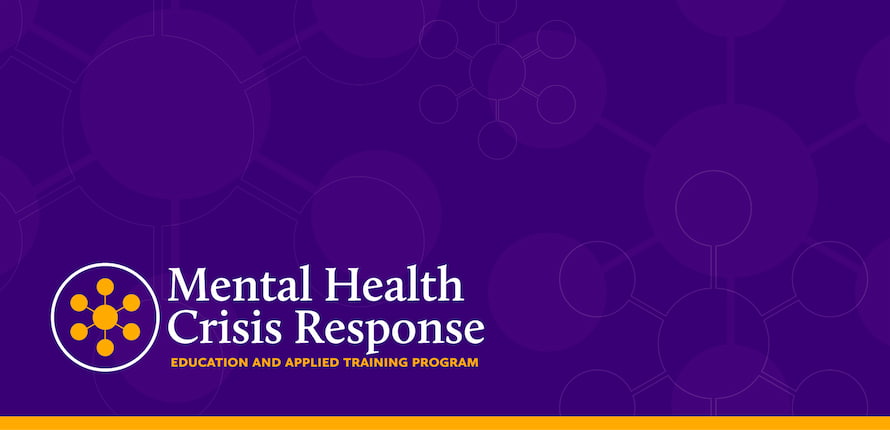We use cookies on this site to enhance your experience.
By selecting “Accept” and continuing to use this website, you consent to the use of cookies.
Search for academic programs, residence, tours and events and more.

The Mental Health Crisis Response (MHCR) Education and Applied Training Program is a scenario-based, community co-designed curriculum that offers enhanced training in de-escalation tactics and communication for all officers in Ontario. Developed and tested over an eight-year period, the MHCR is an evidence-based curriculum vetted by diverse experts.
More information will be posted as it becomes available. Complete the MHCR form to stay informed about the program, including webinars, pricing, and information kits.
The MHCR features:
The program is guided by the DePICT™ model, a built-in and validated assessment tool that measures de-escalation competencies specific to policing and highlights targeted skills integral to working with people in crisis. Trainers assess and evaluate trainees through a comparative analysis of pre- and post-scenario training competencies while providing a guide for targeted debriefing to support formative learning, reinforce de-escalation techniques, and identify specific areas to focus on for continued skills development.
The MHCR evolved through a community co-design framework. This approach is characterized by a working relationship between professionals and citizens, where each party plays a pivotal role in informing best practices to improve the quality of life for people and communities (Slay & Stephens, 2013). Collaboration cannot be understated with respect to mental health and substance use crises, given that these particular concerns exceed the capacity of any singular discipline and are community-based issues.
As such, the MHCR was created by a trans-disciplinary team of over 40 individuals including:
Consequently, the program focuses on the relational policing approach, which emphasizes a genuine and personalized response.
Relational policing is:
The MHCR is a homegrown curriculum that is culturally, geographically, and jurisdictionally relevant to the needs of Ontario citizens and police officers. The program offers a rigorous response and demonstrates a commitment to addressing the recommendations made in the Ontario Ombudsman’s (2016) report “A Matter of Life and Death: Investigation into the Direction Provided by the Ministry of the Solicitor General to Ontario’s Police Services for De-escalation of Conflict Situations.”
This domestic approach to crisis de-escalation is particularly important given the unique landscape of policing and mental health in Canada. As a community-designed curriculum, the MHCR reflects local training priorities, protocols, vocabulary, and province-wide stakeholder investment. It emphasizes relational policing, an award winning framework centred on officers offering a genuine and personalized response to people in crisis, conveying empathy and concern for wellbeing, and taking the necessary time to cultivate a connection and build trust while managing safety risks.
A hallmark of this approach is encouraging the person in crisis to collaborate on ways to peacefully resolve the situation together with the officer. Relational policing is multifaceted in its approach and includes humanized, person-centred, procedurally just, empathetic, informed, and culturally safe modes of engagement (Lavoie et al., 2022).
As of April 1, 2024, the MHCR is mandatory training for all officers in Ontario with required requalification training every 12 months, as outlined in the Community Safety and Policing Act (CSPA). To be compliant with the legislation, MHCR training must be provided by an instructor certified through Wilfrid Laurier University’s MHCR Train-the-Trainer (MHCR-T3) program.
To meet the regulatory and requalification requirements, all officers must complete the following.
|
Requirements |
Estimated Duration |
|
Part 1 - 4 online modules with passing grades on quizzes 1 Forum Scenario online primer module |
4 hours, 40 minutes 25 minutes |
|
Part 2 - 1 Forum Scenario (in person) |
90 minutes |
|
Part 3 - 1 Evaluation Scenario (in person) |
20 minutes |
|
Requirements |
Estimated Duration |
|
Part 1 - Passing grade on 4 online quizzes |
40 minutes (10min per quiz) |
|
Part 2 - 1 Forum Scenario (in person) |
90 minutes |
|
Part 3 - 1 Evaluation Scenario (in person) |
20 minutes |
There are three components to the CPSA mandated MHCR Training. All sworn officers in Ontario are required to take Parts 1-3.
|
Course/Options |
Cost |
Fee Schedule |
|---|---|---|
|
MHCR Online Modules (Part 1) |
$30/member |
Annually |
|
Option A (Part 2 and 3) University-led Delivery (this option includes the use of VR equipment) |
$300/member |
Annually |
|
Option B (Part 2 and 3) MHCR Train-the-Trainer (T3) - Hybrid (online and 3 days in-person) Certified trainers are able to train service members using live-action and/or VR. |
$1500/trainer certification |
Valid for three years |
|
Live-action Actors |
Pricing and availability will vary |
Cost for live actors is at the expense of the service |
|
Virtual Reality Equipment |
Contact: |
Cost of the VR equipment and license is at the expense of the service |
Contact Us:
E: MHCR@wlu.ca